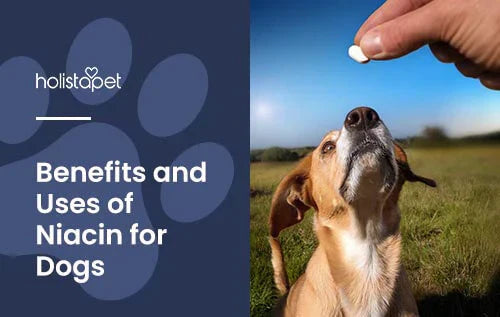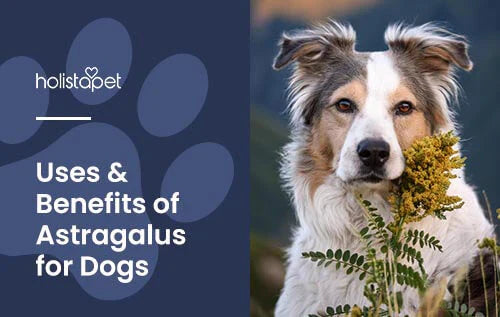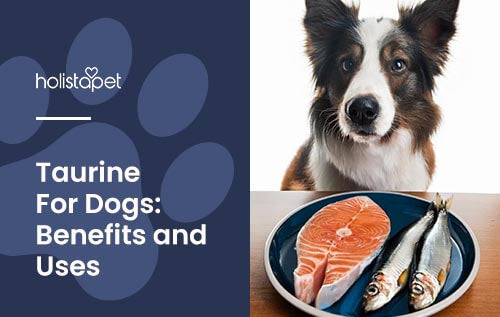Just like you need gas to keep your car running, your dog needs special nutrients to stay energized and healthy. Niacin for dogs is one of these key nutrients.
Niacin helps your furry buddy convert food into energy, giving them fuel for playtime and cuddles. Aside from energy production, the essential nutrient also supports brain function, skin and coat condition, digestion, and overall health.
In this guide, we'll tell you all about niacin. Find out what it can do for your dog's health and how you can give your pup all the niacin they need.
What Is Niacin and What Does It Do?
Niacin, also called vitamin B3, is a water-soluble vitamin. Being water-soluble basically means it dissolves in water and is easily absorbed by the body. Unlike fat-soluble vitamins, water-soluble ones are not stored in large amounts in the body. Instead, dogs need to consume them regularly.
How important is niacin? Vitamin B3 is an essential nutrient. This means pups cannot produce it on their own and must get it from their diet. Dogs need healthy niacin levels to keep different internal processes working smoothly.
What Are the Health Benefits of Niacin for Dogs?
Niacin plays a crucial role in promoting optimal health in dogs. In the next sections, we'll discuss how the essential nutrient brings these benefits:
- Energy Metabolism
- Nervous System Function
- Supports Healthy Digestion
- Promotes Healthy Skin and Coat
- Hormone Production Support

Energy Metabolism
Niacin helps maintain your dog's healthy and active lifestyle by supporting energy production. Vitamin B3 helps convert carbohydrates, fats, and proteins into energy. This energy metabolism gives your pup enough power for their activities, from playful runs to restful sleep.
Nervous System Function
Niacin helps dogs stay mentally sharp and alert, especially in their golden years. This vitamin supports proper communication between the brain and the body, promoting a healthy nervous system and cognitive function. Aging pets that need a little brain boost will find niacin super useful.
Supports Healthy Digestion
Adequate levels of vitamin B3 can lead to better nutrient absorption and digestive health. You see, niacin helps break down food into nutrients the body can use for fuel. This process helps maintain a healthy digestive system and makes sure your canine companion gets the most out of their diet.
Related Product:
Promotes Healthy Skin and Coat
A shiny coat and clear skin usually mean good health in dogs. You can better support your pup's skin and coat health thanks to niacin. This essential vitamin aids the production of natural oils that keep the skin moisturized and the coat glossy. It also helps reduce irritation and improves overall skin health, keeping your dog safe from itching.
Hormone Production Support
When dogs have enough niacin, they can avoid hormonal imbalances. This key nutrient supports the endocrine system by helping produce stress response, metabolism, and growth hormones. This health benefit promotes overall vitality and well-being in our canine companions.
What Is Niacin Deficiency in Dogs?
Nutritional deficiencies are never fun. Niacin deficiency, in particular, can take a big toll on your dog's health. This condition can happen if your pet doesn't have a balanced diet and doesn't get adequate levels of vitamin B3. And because this vitamin helps with different internal processes, a shortage can cause health problems.
Symptoms and Treatment Suggestion of Niacin Deficiency in Dogs
Wondering if your furry pal has niacin deficiency? Observe their behavior and check for the following:
- Lack of Energy
- Skin Irritation
- Dull or Rough Coat
- Upset Stomach
To treat niacin deficiency, you'll need your vet's help. Go for a checkup to get a proper diagnosis and treatment plan. Your vet may recommend updating your dog's diet or adding supplements. To prevent complications, get expert help as soon as you see any of the symptoms above.

How Can I Make Sure My Dog Has Enough Niacin?
So, you already know what niacin is, what good it can do, and what a deficiency might involve. Now, you're wondering how to give your dog enough of this vital nutrient. There are two ways to do this:
- Niacin-Rich Foods for Dogs
- Niacin Supplements for Dogs
Niacin-Rich Foods for Dogs
When it comes to your dog's nutrition, a balanced diet should always be your top priority. Whether you're feeding them a raw diet or a commercial one, it's important they get all the nutrients they need. To up your furry pal's niacin intake, try these dog-safe food sources:
- Chicken
- Turkey
- Liver
- Fish
- Brown Rice
- Barley
Niacin Supplements for Dogs
Supplements provide additional nutritional support. These helpful products come in different forms:
- Treats and Chews. Dogs love supplements that come in hard treat and soft chew forms. They're like yummy rewards you can give during playtime or training sessions. You can try our bestselling Multivitamin Soft Chews for Dogs, which has niacin and other beneficial nutrients for overall canine health. Aside from vitamin B3, your pet can get vitamins A, C, D, and E, calcium, magnesium, taurine, iron, and much more!
- Tablets. If you have a cooperative pup who doesn't mind taking pills and tablets, give one to them directly for a precise dose.
- Powders. Powders are great for picky eaters. Mix a supplement powder with your dog's food for a nutrition boost.
- Injections. In some cases, a vet may give injections to treat niacin deficiency.
How Much Niacin Do Dogs Need Daily?
The right niacin dosage depends on a dog's size, age, and activity levels. But generally, dogs need about 11.4 mg of niacin per kilogram of food they eat. To get the right dose for your four-legged friend, ask your vet. They can assess your pup and recommend the right amount.
Can Dogs Have Too Much Niacin?
Yes, dogs can have too much niacin, so you must keep a close eye on your pup. While niacin plays a big role in canine wellness, high doses can lead to health issues. Consult your vet about your dog's diet and supplements to avoid unpleasant side effects. They can suggest adjustments to prevent niacin overdose.
Dangers of Niacin Overdose in Dogs
Too much niacin can make your dog feel unwell. Watch out for these warning signs:
- Vomiting
- Diarrhea
- Increased Heart Rate
- Skin Flushing
- Stomach Troubles
- Liver Damage
These symptoms can appear if your dog consumes high doses of niacin over a prolonged period. If you worry your pup has taken too much niacin, take them to the vet, stat.
How Can I Monitor My Dog's Niacin Levels?
The best way to keep track of your dog's niacin levels is through regular checkups. Your vet can perform blood tests to check for deficiencies or excesses in your pet's body.
You can also look for possible signs of niacin imbalance. Changes in your dog's energy levels, skin condition, or digestion can give you clues.
How To Tell if a Dog's Niacin Levels Are Doing Better
Aside from checkups and blood tests, some signs can mean improvements in your pup's niacin levels. If you observe any of these, confirm with your vet:
- Increased Energy
- Consistent Appetite
- Shinier Coat
- Less Skin Irritation
- Better Digestion
The Final Word on Niacin for Dogs
By now, we can agree that all dogs need niacin for their optimal health and overall vitality. This essential nutrient does wonders for dogs' energy metabolism, cognitive function, digestive system, skin and coat health, and hormone production. What's not to love?
Niacin food sources and supplements (like our multivitamin) in your dog's diet can help them live their best life. With these resources and your vet's help, your furry friend can live a healthy and active lifestyle for years and years to come! If you want to learn more about your dog's nutrition browse these blogs here.


 CBD Oil for Dogs - Fast Acting
CBD Oil for Dogs - Fast Acting
 Chicken Flavored CBD Oil For Dogs - Easy Dose
Chicken Flavored CBD Oil For Dogs - Easy Dose
 Salmon Flavored CBD Oil For Dogs - Highly Rated
Salmon Flavored CBD Oil For Dogs - Highly Rated
 CBG Oil for Dogs and Cats - Loved by Thousands
CBG Oil for Dogs and Cats - Loved by Thousands





Leave a comment
All comments are moderated before being published.
This site is protected by hCaptcha and the hCaptcha Privacy Policy and Terms of Service apply.